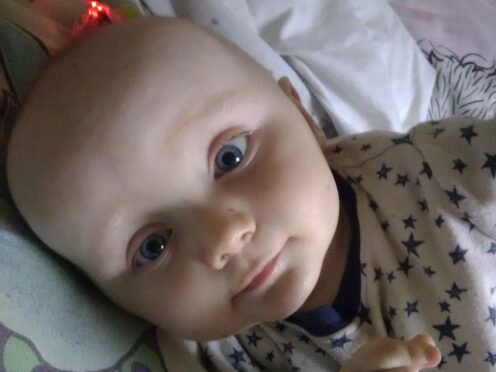
A 10-month-old baby who was murdered by his parents just weeks after being placed back into their care “should have been one of the most protected children in the local authority area”, a safeguarding review has concluded.
Finley Boden’s parents, Shannon Marsden and Stephen Boden, inflicted 130 injuries on their son before he fatally collapsed at his family home in Old Whittington, Chesterfield, Derbyshire, on Christmas Day 2020.
Finley had been returned to their care on November 17 that year by a family court, despite social services raising concerns over Boden and Marsden’s drug use and the state of the family home.
After returning home, Finley was subjected to a campaign of abuse and was found to have 130 separate injuries at the time of his death, as well as conditions including sepsis and pneumonia.
Marsden and Boden were handed life sentences with respective minimum terms of 27 and 29 years at Derby Crown Court in May.
On Wednesday, the Derby and Derbyshire Safeguarding Children Partnership published the findings of a Local Child Safeguarding Practice Review into Finley’s death.
The review, which has been anonymised, said: “In this instance, a child died as the result of abuse when he should have been one of the most protected children in the local authority area.”
It stated that, while Finley’s parents were responsible for his death, “professional interventions should have protected him”.
It said the “most significant professional decision” was that he should live with his parents, and concluded that “the safeguarding environment in which that decision was made had been incrementally weakened by the decisions, actions, circumstances and events which preceded it”.
Most of what had been experienced by Finley in the final weeks of his life “was unknown to professionals working with the family at that time”, the report said.
But it added: “The review has found, nevertheless, that safeguarding practice during that time was inadequate.”
At their sentencing last year, Mrs Justice Amanda Tipples said Marsden and Boden were “persuasive and accomplished liars” who “brutally assaulted” their son.
Details of a Family Court order, made in October 2020 and disclosed to the media last year, showed that magistrates said Finley should be given back to his parents within eight weeks and without them being drug tested.
That was despite Derbyshire County Council telling the Family Court they had “some concerns” over Boden and Marsden’s cannabis use, asking the court for a four-month transition period in order to have “complete confidence” in their parenting abilities.
The Family Court heard from the Children and Family Court Advisory and Support Service (Cafcass) that the risk of harm posed to Finley by his parents was not unmanageable and did not require him to be placed out of their care “in the foreseeable future”.
The safeguarding review found “significant shortcomings” in relation to plans for family reunification, stating that “positive assessments” of his parents’ capabilities to care for him “fell short of an adequate evaluation of the risks” to which he would be exposed.
Responding to the safeguarding review, Cafcass said it was “profoundly sorry that together we were unable to prevent” Finley’s death.
The service said that at the time of the court decision in October 2020 “everyone involved – including his guardian – believed his parents had made and sustained the changes necessary to care for him safely”.
They added: “What led to his death was the ability of Finley’s parents to deceive everyone involved, about their love for him and their desire to care for him.
“No-one could have predicted from what was known at the time that they were capable of such cruelty or that there was a risk that they would intentionally hurt him, let alone murder him.”
Derbyshire County Council’s children’s services apologised for the “missed opportunities”.

The council’s executive director for children’s services, Carol Cammiss, described Finley’s death as “a tragedy for everyone who knew him and everyone involved in his care”.
She said: “Despite the significant Covid restrictions placed on our work at the time, we know there were missed opportunities for stronger practice and we apologise for that.”
She said the council had acted quickly after Finley’s death to “review and strengthen our systems and continue to monitor the way we work with babies and families” and that it accepts the findings and recommendations of the review “and takes full responsibility for its actions in this case”.
The Derby and Derbyshire Safeguarding Children Partnership said it accepts the review’s recommendations in full and will “take the additional action necessary to further reduce the risk of a repeat of a similar incident”.
The review made 11 recommendations in total, including that the partnership carries out “a multi-agency audit” of recent parenting assessments to consider the quality of analysis and conclusions, involvement of partner agencies, evidence of scrutiny by managers. and, effectiveness of information-sharing and professional challenge.
Other recommendations included that the local authority should provide evidence by the end of June of improved practice in distinguishing between informal family arrangements and formal placements – in which the local authority has responsibility to provide support – since 2020.
The review also made recommendations on the safeguarding children partnership working with local public health commissioners of substance misuse services, and to ensure arrangements are in place “to deliver an effective local response to domestic abuse”.

Enjoy the convenience of having The Sunday Post delivered as a digital ePaper straight to your smartphone, tablet or computer.
Subscribe for only £5.49 a month and enjoy all the benefits of the printed paper as a digital replica.
Subscribe